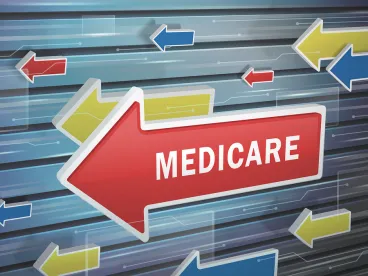On October 29, 2015, the Centers for Medicare and Medicaid Services (CMS) and the Office of Inspector General (OIG) published a final rule regarding the waiver of several federal health care fraud and abuse laws with respect to arrangements involving accountable care organizations (ACOs) participating in the Medicare Shared Savings Program (MSSP), their participating providers and certain other non-participating providers, and the Medicare beneficiaries assigned to the ACO (each described below). CMS and OIG generally adopted the waivers that the agencies previously promulgated pursuant to an interim final rule published on November 2, 2011, with a few notable exceptions and clarifications identified in this article. We describe here any material updates to our analysis of the participation waiver stemming from the final rule, as well as highlight significant changes or clarifications that apply to all of the waivers generally.
Waiver Overview
CMS and OIG finalized the following five waivers in the final rule:
-
A waiver of the federal Stark law (the Stark Law) and federal anti-kickback statute (the Anti-Kickback Statute) that applies to ACO-related start-up arrangements in anticipation of participating in the MSSP, subject to certain limitations, including limits on the duration of the waiver and the types of parties covered (the Pre-Participation Waiver)
-
A waiver of the Stark Law and Anti-Kickback Statute that applies broadly to ACO-related arrangements during the term of the ACO’s participation agreement under the MSSP and for a limited period of time thereafter (the Participation Waiver)
-
A waiver of the Stark Law and Anti-Kickback Statute that applies to distributions and uses of shared savings payments earned under the MSSP (the Shared Savings Distributions Waiver)
-
A waiver of the Anti-Kickback Statute for ACO arrangements that implicate the Stark Law and satisfy the requirements of an existing exception (the Compliance with Stark Law Waiver), and
-
A waiver of the civil monetary penalties law provisions addressing inducements to Medicare beneficiaries (the Beneficiary Inducements CMP) and the Anti-Kickback Statute for medically related incentives offered by ACOs or their participating providers under the MSSP to Medicare beneficiaries to encourage preventive care and compliance with treatment regimes (the Patient Incentives Waiver)
The Waivers No Longer Waive the Gainsharing CMP
In the interim final rule, CMS and OIG included a waiver of the civil monetary penalties law provisions addressing hospital payments to physicians to reduce or limit services (the Gainsharing CMP) in the Pre-Participation, Participation, Shared Savings Distribution, and Compliance with Stark Law Waivers. In the final rule, the agencies removed the waiver of the Gainsharing CMP with respect to such waivers. At the time CMS and OIG published the interim final rule, the Gainsharing CMP prohibited hospitals from making payments to physicians to induce the physicians to reduce or limit medical services, including medically un-necessary services. CMS and OIG stated that the agencies included a waiver of the Gainsharing CMP in the interim final rule explicitly to permit hospitals to make payments to physicians to reduce medically un-necessary services. In 2015, Congress amended the Gainsharing CMP to remove the prohibition on inducements to reduce or limit the provision of medically un-necessary services. In light of this statutory change, CMS and OIG removed the Gainsharing CMP from the waivers because, from the agencies’ perspective, the original need for waiving the Gainsharing CMP no longer exists. But CMS and OIG made clear that they believe that this change to the waivers will not affect the ability of parties to enter into arrangements that previously fit into a waiver of the Gainsharing CMP in the interim final rule. As the agencies explained, “[p]ayments from hospitals to physicians to reduce or limit medically necessary services are not, and never have been, consistent with the purposes of the [MSSP], were not protected by the waivers in the [interim final rule], are not permitted by the amended Gainsharing CMP, and are not protected by the waivers in this final rule.” The agencies’ admonishment fails to recognize the grey area between medically necessary and medically un-necessary services. ACOs that sought to mitigate the risk associated with such grey area by qualifying certain gainsharing arrangements for protection based on an interpretation that the waiver of the Gainsharing CMP was a blanket waiver of the law must now verify that their arrangements are compliant with the amended Gainsharing CMP in all respects.
CMS and OIG Determined that the Waivers Adequately Protect Beneficiaries and the Federal Health Care Programs
In the interim final rule, CMS and OIG stated that they “plan to narrow the waivers . . . unless . . . information gathered through monitoring or other means suggests that such waivers have not had the unintended effect of shielding abusive arrangements.” That is, in the absence of affirmative evidence that there is no abuse, CMS’s and OIG’s stated intention was to narrow the waivers. In the final rule, CMS and OIG confirmed that the “information available to [them] suggests that the waivers are adequately protecting beneficiaries and federal health care programs . . . . In this final rule, we are not narrowing the waivers.” This statement is helpful to industry participants generally, and in particular to those that may have been waiting for CMS and OIG to publish the final rule prior to entering into arrangements requiring waiver protection out of the fear that it would need to un-wind these arrangements if the agencies significantly narrowed the waivers in the final rule. The agencies’ confirmation that any future modifications of the waivers would be implemented through notice-and-comment rulemaking provides an additional level of certainty to such cautious stakeholders, because they will have the ability to obtain notice of, and participate in the development of, any waiver modifications.
Although CMS and OIG did not narrow the waivers, the agencies “underscore[d] that the waivers have never been intended to, and will not, cover arrangements unless all criteria for the applicable waiver are met. . . . [T]here is no retroactive protection.” This statement seems potentially at odds with one statement in the final rule regarding, under the Pre-Participation and Participation Waivers, for bona fide governing body approval. In particular, with respect to that requirement, CMS states that one factor they “would consider when evaluating whether the ACO governing body’s determination is bona fide would be the proximity in time between the establishment of the arrangement … and the ACO governing body’s corresponding determination and authorization. For example, a significant passage of time between the establishment of the arrangement and the ACO governing body’s determination might indicate that the ACO governing body did not make a bona fide determination.” This seems to suggest that the waiver requirements could be satisfied, in some cases, even if the governing body determination occurred after the implementation of the arrangement. Whether this is the case or not, ACOs would be well-advised to secure all necessary requirements prior to the effective date of the arrangements for which they seek waiver protection including, with respect to the Participation Waiver for example, ACO governing body approval and the associated documentation (e.g., written resolution), and documentation of the arrangement (e.g., signed written agreement).
Free Transportation Programs Offered to Medicare Beneficiaries Qualify for Protection Under the Patient Incentives Waiver
Although CMS and OIG received no public comments on the issue, the agencies took the opportunity to clarify to stakeholders that nothing would preclude local transportation arrangements from being an in-kind item or service under the Patient Incentive Waiver. Therefore, transportation provided by an ACO or one of its participating providers to a beneficiary would be protected like other in-kind items and services if the parties satisfy the relevant waiver requirements. The agencies clarified that transportation provided to a patient for purposes of getting to a medical appointment or to pick up prescriptions could be protected, but transportation to attend entertainment or recreational events, or to run errands un-related to the medical care of the beneficiary, could not. The agencies also clarified that, because the waiver only protects in-kind incentives, ACOs may not give beneficiaries cash reimbursement for transportation costs, but may be give them prepaid vouchers redeemable solely for transportation services pursuant to a written contract between the ACO / ACO participant and the transportation provider.





 />i
/>i

